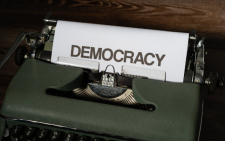Facebook not a saint in social media rot

Facebook Whistleblower Frances Haugen hours-long testimony to the United States Senate Commerce Consumer Protection subcommittee on Tuesday, last week, comprised a long account of negative effects of the company’s platforms on children.
And, although Facebook is aware of this situation, Haugen said “the company’s leadership knows how to make Facebook and Instagram safer, but won’t make the necessary changes because they have put their astronomical profits before people”.
Studies show teenage indulgence in social media is associated with high levels of anxiety and depression.
This is because social media tends to normalise delinquency and leads to unhealthy social status comparisons among young impressionable minds.
Young people spend inordinately long hours every day on social media platforms whose messages usually suggest that the grass is always greener on the other side.
The allegations against Facebook, which also owns Instagram and WhatsApp, are not entirely new.
Most of the accusations facing the social media giant have been expressed over the years by various researchers.
But the malady does not just afflict Facebook and its platforms alone. The status quo is prevalent across the social media gamut, where the platforms have become a law unto themselves.
Indeed, analysts view the last Monday’s six-hour blackout of Facebook and its platforms as diversionary and a thinly veiled marketing gimmick cum blackmail.
It was aimed to act as proof that the company has become an integral, if not inseparable, part of the global economy.
Whether the authorities will use that as a mitigating factor in its recommendations on any regulations on Facebook, is right now a matter of conjecture.
Accusations that Facebook algorithms promote divisions, is true across the spectrum of popular social media.
The processes used to identify and target certain audiences isolate others and places them at a disadvantage or pits the values of demographics against each other.
This discrimination negates the requirement of universal access to information.
The fact that Facebook prioritises profit over users’ safety and human dignity, is a characteristic of the West’s unbridled capitalism.
This phenomenon includes various industries particularly in the fast moving consumer goods sector; some sections of Big Pharma are part of this.
The social and economic repercussions of unbridled capitalism are far reaching and the damage takes long to ameliorate.
Governments are increasingly placing sanctions on some social media platforms for inciting political conflict among the citizenry or leading the people morally astray.
Going forward, the trend could be increased control over social media content as authorities try to stop them from running amok and tearing their countries’ social fabric.
For the avoidance of doubt, a lot of e-commerce thrives on social media platforms, as millions of people globally exchange ideas and trade in goods and services.
These platforms have broken down the confines of time and place. The Covid-19 has driven this point home as international meetings and activities have been held virtually, successfully.
Amid their harmful effects, social media also offer psycho-social support between people and also acts as a bridge between different cultures.
But that should not give social media platforms a carte blanche to operate in a moral vacuum, where anything is permissible.
Some level of regulation is necessary to ensure that they do not mislead young minds, by distorting reality.
The owners of the platforms must also be responsive to the socio-cultural sensibilities of their audiences and avoid preying on vulnerable or immature minds.
The subcommittee hearing should be Facebook’s food for thought. The accusations should encourage serious soul searching by the platform owners on one hand and resolve by lawmakers to create a strong regulatory framework that guides the operations of social media on the other.
The platforms have become like drugs whose dosage must now be prescribed. — The writer comments on international affairs












